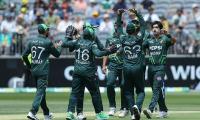Karachi
Observing the 44th anniversary of the most formidable labour uprising to have been witnessed in Pakistan, trade union leaders and civil society activists on Tuesday paid rich tributes to martyrs of the 1972 labour movement.
The event was organised by Piler (Pakistan Institute of Labour Education and Research), and addressed by some of the leading activists of the time and present.
What started off as a peaceful strike in December 1971 had grown into a full blown movement by June 1972 after the ruling party, led by Zulfiqar Ali Bhutto, continued to over look labours’ demands of putting a stop to the factory owners’ anti-workers policies.
As the protestors continued to observe a shutter down strike, it was on June 7 when local police officers opened fire at the demonstrators outside Feroz Textile Mills, located in SITE.
The incident resulted in the death of a leading figure of Muttahida Mazdoor Federation Shoaib Khan. Angered at a fellow workers’ death, a large number of workers from all industrial estates of the city had gathered at Khan’s funeral to protest police brutality.
However, the police officers were yet again ordered to open fire, by city commissioner at the time AT Naqvi, which resulted in the deaths of five more labourers.
Addressing the event Piler Executive Director Karamat Ali said the labour movement was the most historical working class movement to ever have occurred in Pakistan.
“All workers stood united regardless of their ethnicities.”
Ali, however, regretted that the movement could not sustain due to several constraints, which included the workers’ lack of exposure to and connection with labourers belonging to other countries.
He further observed that still was a chance for labourers to organise themselves for a joint cause, by forming labour unions.
In 1977 there were around 8,000 unions with an enrolment of one million workers, but today only one percent of factory workers were part of unions, he stated.
“We can start with textile sector as it employs around 40 percent of the industrial labour in Pakistan.”
Head of Szabist’s Department of Social Sciences, Dr Riaz Shaikh, while speaking at the event called for analysing the labour movement in the global context of the time.
After the fall of Soviet Union in 1991 people said it was the end of the war, however, that did not stand true since other conflicts had emerged by then, Dr Shaikh observed.
He said neo-liberal economy was more exploitative in nature and the fight was now to be fought against economic policies since the overall scenario had drastically changed.
University of Karachi’s director Pakistan Study Centre Dr Jaffer Ahmed, National Party leader Ramzan Memon, senior Piler official Sharafat Ali and Sheema Kermani also spoke at the event.
MQM-P Convener Dr Khalid Maqbool Siddiqui speaks during a dinner party on November 5, 2023. — Facebook@MQMMuttahida...
JI protestors hold banners in this image taken on December 21, 2024 in Karachi.— Facebook@KhijamaatThe...
A representational image showing a traffic jam in Lahore. — Online/FileThe Sindh government has approved the new...
A representational image of a bullet case. — AFP/FilePolice have registered a case against unidentified suspects for...
A participant speaking at the hunger strike organised by Sindh United Party outside the Hyderabad Press Club on...
Students appearing in a test. — APP/FileA judicial magistrate has returned bail applications of six suspects,...







